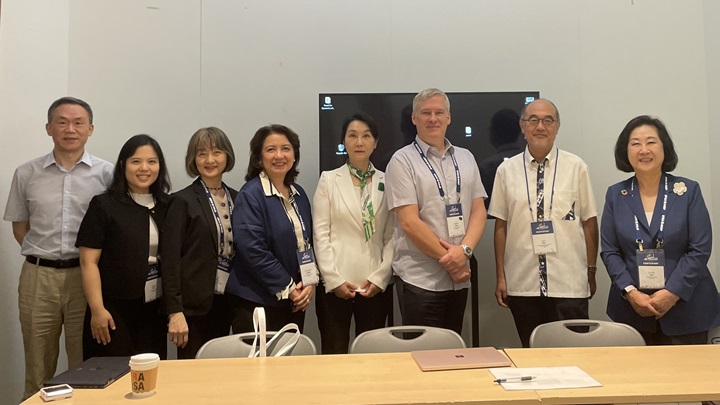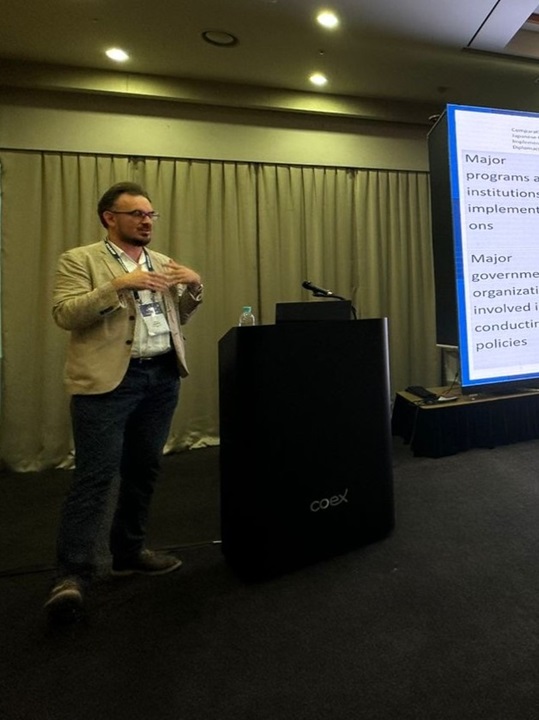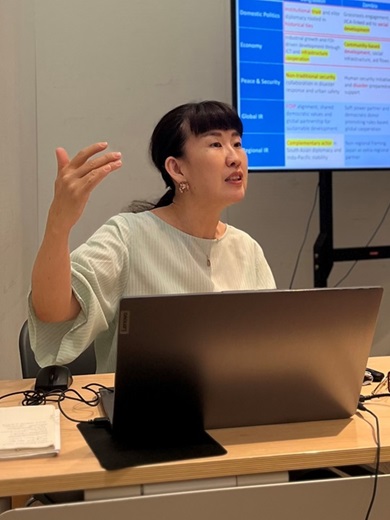JICA Ogata Research Institute Presents Research Findings at the 2025 IPSA World Congress
2025.09.29
From July 12 to 16, 2025, the International Political Science Association (IPSA) held its World Congress in Seoul, South Korea, under the theme “ Resisting Autocratization in Polarized Societies.” Researchers from the JICA Ogata Sadako Research Institute for Peace and Development (JICA Ogata Research Institute) participated and they presented their findings in the following discussions:
Mine Yoichi , Executive Director of the JICA Ogata Research Institute and lead researcher of the projects “Human Security in Practice: East Asian Experiences ” and “Human Security and the Practices of Empowerment in East Asia ” gave a presentation together with Muto Ako , Specially Appointed Research Fellow, who also contributed to these projects and their resulting publications. Their co-editors, Ren Xiao (Professor, Beijing Foreign Studies University), Kim Eun Mee (Professor Emeritus, Ewha Womans University), and Mely Caballero-Anthony (Professor, Nanyang Technological University), joined the discussion.
Mine explored the theoretical aspects of human security, referencing the contributions of Amartya Sen and Ogata Sadako, and the relationship between human security and peace studies. He also introduced the key findings from the research projects that culminated in the two books “Human Security and Cross-Border Cooperation in East Asia ” and “Human Security and Empowerment in Asia: Beyond the Pandemic ,” along with other human security research outcomes of work done by the Institute.
Muto examined the diverse practices of human security discussed in these books, organizing them through the lenses of “protection,” “empowerment,” “solidarity,” and “trust,” and emphasized the importance of continuing case studies on human security practices.
During the Q&A session, it was reaffirmed that human security, which shifts the focus of security to people, and state security can effectively complement each other. A lively discussion followed on how human security perspectives can provide guidance in a world where state security often takes precedence amid growing polarization.

Panelists including Executive Director Mine Yoichi (second from right) and session chair Professor Emeritus Kim Eun Mee (far right).

Visiting Fellow Nikolay Murashkin presenting his comparative study on Japan and South Korea.
Nikolay Murashkin , Visiting Fellow, delivered a presentation comparing how Japan and South Korea conceptualize and implement knowledge diplomacy towards Uzbekistan. This comparative research helps understand how the two countries share their respective development experiences with partner countries. Extant scholarship has shown that East Asian countries stepped up their development knowledge-sharing in recent decades. In this context, the roles of Japan and South Korea are particularly interesting as both countries are OECD Development Assistance Committee (DAC) members with East Asian development experience and a past track record of formerly being recipients themselves. This qualitative research, based on interviews with experts and participants of cooperation activities conducted under South Korean and Japanese programs related to knowledge co-creation and knowledge diplomacy, as well as on the discourse analysis of respective documentation. demonstrates the particularities of knowledge-sharing interaction between, on the one hand, Uzbekistan, and, on the other hand, Japan and South Korea individually, and the role of knowledge in bilateral relations between these states.
The ensuing discussion touched upon the novelty of the concept of “knowledge diplomacy,” especially outside the field of foreign policy scholars, and on the nuances of the usage of this term and related terms, such as knowledge co-creation, among practitioners and academics.

Then-Research Officer Imai Natsuko presenting her comparative analysis of online media narratives
Then-Research Officer Imai Natsuko presented findings from the JICA Ogata Research Institute’s project, “The New Dynamics of Peace and Development in the Indo-Pacific: How Countries in the Region Proactively Interact with China .” This study analyzed online media in Bangladesh, Zambia, Laos, and Sri Lanka, comparing their coverage and narratives regarding bilateral relations with major powers—China, Japan, the United States—and their respective regional powers (India for Bangladesh and Sri Lanka, Thailand for Laos, and South Africa for Zambia).
Using a combination of text mining and discourse analysis across five dimensions—domestic politics, economy, peace and security, international relations (global), and international relations (regional)—Imai demonstrated that “economic development” was a common theme in all four countries. At the same time, she showed that the tone of reporting varied depending on regime openness, historical ties with major powers, and the current geopolitical context. She noted that smaller states are no longer passive actors; rather, they strategically interpret their geopolitical positions and actively engage in discourse with major powers.
Participants expressed strong interest in the combined use of quantitative and qualitative methods, as well as the integration of media analysis with geopolitical insights. The session concluded with an active exchange of ideas on the future potential of media research.

事業事前評価表(地球規模課題対応国際科学技術協力(SATREPS)).国際協力機構 地球環境部 . 防災第一チーム. 1.案件名.国 名: フィリピン共和国.

事業事前評価表(地球規模課題対応国際科学技術協力(SATREPS)).国際協力機構 地球環境部 . 防災第一チーム. 1.案件名.国 名: フィリピン共和国.

事業事前評価表(地球規模課題対応国際科学技術協力(SATREPS)).国際協力機構 地球環境部 . 防災第一チーム. 1.案件名.国 名: フィリピン共和国.

事業事前評価表(地球規模課題対応国際科学技術協力(SATREPS)).国際協力機構 地球環境部 . 防災第一チーム. 1.案件名.国 名: フィリピン共和国.

事業事前評価表(地球規模課題対応国際科学技術協力(SATREPS)).国際協力機構 地球環境部 . 防災第一チーム. 1.案件名.国 名: フィリピン共和国.
scroll